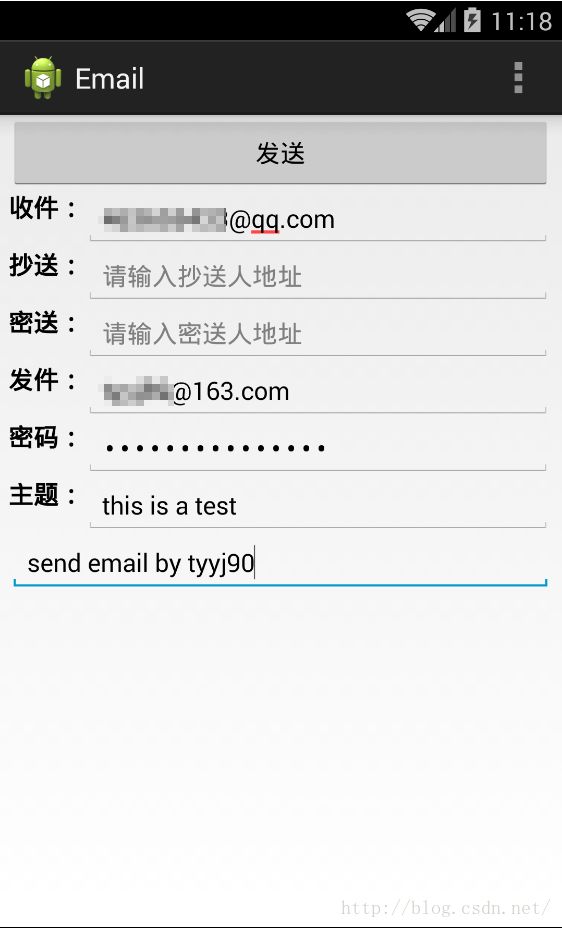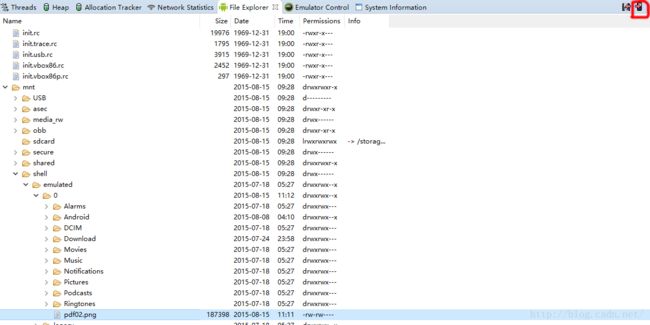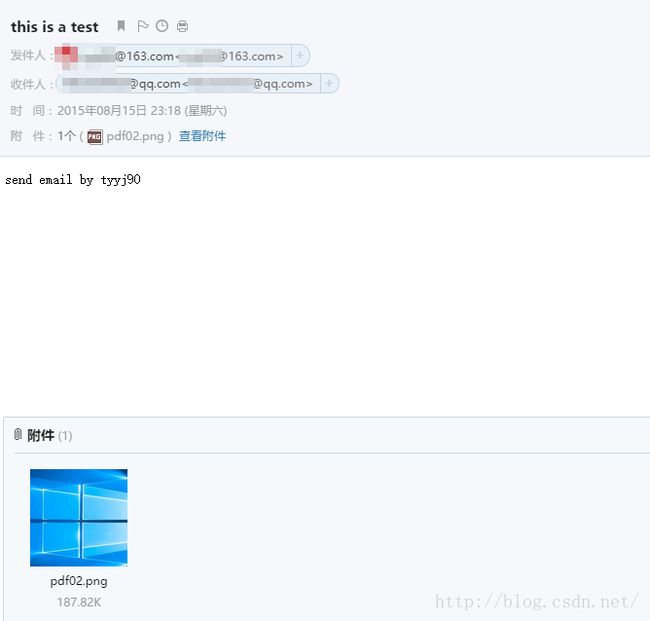Android下发送邮件功能总结
最近项目用到邮件发送功能,自然联想到掉起手机自带的邮件APK,但太过于依赖于系统的邮件apk,如何你需要默默后台发送邮件,这种功能显然是无法满足的,经过查阅资料基本可以找到两种现有的解决方案。
1、第一种使用commons-net-3.3.jar
此jar可以实现简单的邮件发送,如果你只需要发送简单的文本邮件,这个包就可以满足需求。这个包封装的还是比较好的,监听接口等都很完善,使用也非常方便,唯一的缺点就是不支持附件、HTML等方式发送邮件,除非自己去扩展这个包,根据SMTP协议实现图片、附件、HTML邮件。
当然这个包还有其他功能,封装了很多协议,具体如下:
- FTP/FTPS
- FTP over HTTP (experimental)
- NNTP
- SMTP(S)
- POP3(S)
- IMAP(S)
- Telnet
- TFTP
- Finger
- Whois
- rexec/rcmd/rlogin
- Time (rdate) and Daytime
- Echo
- Discard
- NTP/SNTP
2、使用mail.jar核心邮件包实现邮件发送功能
可支持附件、图片、HTML等邮件形式,使用这个包需要引入activation.jar、additionnal.jar,这样就可以实现带有附件的邮件发送了,这才是我们真正需要的,一般来说不能发送附件还是比较鸡肋的,当然这个mail.jar使用起来不是那么顺畅,所以apache有一个再次封装的包commons-email-1.4.jar,使用这个包发送邮件就非常简单了。
我已经写了一个DEMO,正式项目已经将本代码重构,这是一个测试DEMO,稍作修改就可以用于项目了。已经调试通过可正常发送邮件。
下面是界面,抄送和密送没有写入,需要你自己加入,具体可以参照Apache官网的对应包的API http://commons.apache.org/
当然第一步你需要向sd卡push 一张png图片(pdf02.png),如果你也是使用genymotion 模拟器可以使用如下方式将图片添加到sd 卡
然后点击界面发送后,logcat 会显示如下信息表示发送成功。
好了,到发件邮箱看看是不是有相应的邮件发出了!
好了,一切Ok!具体核心代码如下:
package com.example.email;
import java.io.File;
import java.io.Writer;
import java.util.regex.Matcher;
import java.util.regex.Pattern;
import org.apache.commons.mail.EmailAttachment;
import org.apache.commons.mail.EmailException;
import org.apache.commons.mail.MultiPartEmail;
import org.apache.commons.net.ProtocolCommandEvent;
import org.apache.commons.net.ProtocolCommandListener;
import org.apache.commons.net.smtp.AuthenticatingSMTPClient;
import org.apache.commons.net.smtp.SMTPClient;
import org.apache.commons.net.smtp.SMTPReply;
import org.apache.commons.net.smtp.SimpleSMTPHeader;
import org.apache.james.mime4j.codec.EncoderUtil;
import org.apache.james.mime4j.codec.EncoderUtil.Usage;
import android.app.Activity;
import android.app.Fragment;
import android.os.AsyncTask;
import android.os.Bundle;
import android.os.Environment;
import android.view.LayoutInflater;
import android.view.Menu;
import android.view.MenuItem;
import android.view.View;
import android.view.View.OnClickListener;
import android.view.ViewGroup;
import android.widget.Button;
import android.widget.EditText;
public class MainActivity extends Activity {
@Override
protected void onCreate(Bundle savedInstanceState) {
super.onCreate(savedInstanceState);
setContentView(R.layout.activity_main);
if (savedInstanceState == null) {
getFragmentManager().beginTransaction().add(R.id.container, new PlaceholderFragment()).commit();
}
}
@Override
public boolean onCreateOptionsMenu(Menu menu) {
// Inflate the menu; this adds items to the action bar if it is present.
getMenuInflater().inflate(R.menu.main, menu);
return true;
}
@Override
public boolean onOptionsItemSelected(MenuItem item) {
// Handle action bar item clicks here. The action bar will
// automatically handle clicks on the Home/Up button, so long
// as you specify a parent activity in AndroidManifest.xml.
int id = item.getItemId();
if (id == R.id.action_settings) {
return true;
}
return super.onOptionsItemSelected(item);
}
/**
* A placeholder fragment containing a simple view.
*/
public static class PlaceholderFragment extends Fragment {
private EditText et_receive, et_cc, et_bcc, et_send, et_pwd, et_subject, et_message;
private Button btn_send;
public PlaceholderFragment() {
}
@Override
public View onCreateView(LayoutInflater inflater, ViewGroup container, Bundle savedInstanceState) {
View rootView = inflater.inflate(R.layout.fragment_main, container, false);
btn_send = (Button) rootView.findViewById(R.id.btn_send);
et_receive = (EditText) rootView.findViewById(R.id.et_receive);
et_cc = (EditText) rootView.findViewById(R.id.et_cc);
et_bcc = (EditText) rootView.findViewById(R.id.et_bcc);
et_send = (EditText) rootView.findViewById(R.id.et_send);
et_pwd = (EditText) rootView.findViewById(R.id.et_password);
et_subject = (EditText) rootView.findViewById(R.id.et_subject);
et_message = (EditText) rootView.findViewById(R.id.et_message);
setListener();
return rootView;
}
private void setListener() {
btn_send.setOnClickListener(new OnClickListener() {
@Override
public void onClick(View v) {
final String receive = et_receive.getText().toString().trim();
final String cc = et_cc.getText().toString().trim();
final String bcc = et_bcc.getText().toString().trim();
final String send = et_send.getText().toString().trim();
final String pwd = et_pwd.getText().toString().trim();
final String subject = et_subject.getText().toString().trim();
final String message = et_message.getText().toString().trim();
// 建立发送邮件任务
new AsyncTask() {
@Override
protected Boolean doInBackground(String... params) {
try {
// sendEmailByApacheCommonsNet(send, pwd,
// receive, subject, message);
System.out.println("send=" + send + ",pwd=" + pwd + ",receive=" + receive + ",subject=" + subject + ",message="
+ message);
sendEmailByApacheCommonsEmail(send, pwd, receive, subject, message);
return true;
} catch (Exception e) {
e.printStackTrace();
return false;
}
}
}.execute();
}
});
}
/**
* 检测邮箱地址是否合法
*
* @param address
* @return true合法 false不合法
*/
private boolean verifyEmailAddress(String address) {
if (null == address || "".equals(address))
return false;
Pattern p = Pattern.compile("\\w+([-+.]\\w+)*@\\w+([-.]\\w+)*\\.\\w+([-.]\\w+)*");// 复杂匹配
Matcher m = p.matcher(address);
return m.matches();
}
/**
* @Description TODO 发送带附件的email
* @throws EmailException
*/
private void sendEmailByApacheCommonsEmail(String from, String fromPwd, String to, String subject, String message) throws EmailException {
if (!verifyEmailAddress(from) || !verifyEmailAddress(to)) {
System.out.println("enter verifyEmailAddress");
return;
}
// Create the attachment
EmailAttachment attachment = new EmailAttachment();
attachment.setPath(Environment.getExternalStorageDirectory().getAbsolutePath() + File.separator + "pdf02.png");
attachment.setDisposition(EmailAttachment.ATTACHMENT);
attachment.setDescription("pdf02");
attachment.setName("pdf02.png");
// Create the email message
MultiPartEmail email = new MultiPartEmail();
email.setDebug(true);
// 这里使用163邮箱服务器,实际需要修改为对应邮箱服务器
email.setHostName("smtp.163.com");
email.setSmtpPort(25);
email.setSocketTimeout(6 * 1000);
email.setCharset("UTF-8");
email.setAuthentication(from, fromPwd);
email.addTo(to, to);
// email.addBcc(arg0);
// email.addCc(arg0);
email.setFrom(from, from);
email.setSubject(subject);
email.setMsg(message);
// add the attachment
email.attach(attachment);
// send the email
String sendStr = email.send();
System.out.println("sendStr=" + sendStr);
}
/**
* @Description TODO 只能发送简单的邮件文本,如需要发送附件需要自己去实现
* @throws Exception
*/
@SuppressWarnings("unused")
private void sendEmailByApacheCommonsNet(String from, String fromPwd, String to, String subject, String message) throws Exception {
if (!verifyEmailAddress(from) || !verifyEmailAddress(to)) {
System.out.println("enter verifyEmailAddress");
return;
}
String hostname = "smtp.163.com";
int port = 25;
String password = fromPwd;
String login = from;
String text = message;
AuthenticatingSMTPClient client = new AuthenticatingSMTPClient();
try {
// optionally set a timeout to have a faster feedback on errors
client.setDefaultTimeout(10 * 6000);
// you connect to the SMTP server
client.connect(hostname, port);
client.addProtocolCommandListener(new ProtocolCommandListener() {
@Override
public void protocolCommandSent(ProtocolCommandEvent arg0) {
System.out.println("protocolCommandSent =" + arg0.getCommand());
}
@Override
public void protocolReplyReceived(ProtocolCommandEvent arg0) {
System.out.println("protocolReplyReceived =" + arg0.getMessage());
}
});
// you say ehlo and you specify the host you are connecting
// from, could be anything
client.ehlo("163");
// if your host accepts STARTTLS, we're good everything will be
// encrypted, otherwise we're done here
if (client.execTLS()) {
System.out.println("enter to login");
client.auth(AuthenticatingSMTPClient.AUTH_METHOD.LOGIN, login, password);
checkReply(client);
client.setSender(from);
checkReply(client);
client.addRecipient(to);
checkReply(client);
Writer writer = client.sendMessageData();
if (writer != null) {
// 使用apache mime4j中的EncoderUtil来编码邮件主题
String encodedSubject = EncoderUtil.encodeIfNecessary(subject, Usage.TEXT_TOKEN, 0);
SimpleSMTPHeader header = new SimpleSMTPHeader(from, to, encodedSubject);
header.addHeaderField("Content-Type", "text/plain; charset=UTF-8");
header.addHeaderField("Content-Transfer-Encoding", "base64");
// 使用apache mime4j中的EncoderUtil来编码邮件正文
String encodedBody = EncoderUtil.encodeB(text.getBytes());
writer.write(header.toString());
writer.write(encodedBody);
writer.close();
if (!client.completePendingCommand()) {// failure
throw new Exception("Failure to send the email ");
}
} else {
throw new Exception("Failure to send the email ");
}
} else {
throw new Exception("STARTTLS was not accepted ");
}
} catch (Exception e) {
throw e;
} finally {
client.logout();
client.disconnect();
}
}
private static void checkReply(SMTPClient sc) throws Exception {
if (SMTPReply.isNegativeTransient(sc.getReplyCode())) {
throw new Exception("Transient SMTP error ");
} else if (SMTPReply.isNegativePermanent(sc.getReplyCode())) {
throw new Exception("Permanent SMTP error ");
}
}
}
}
3、DEMO下载
点此下载



